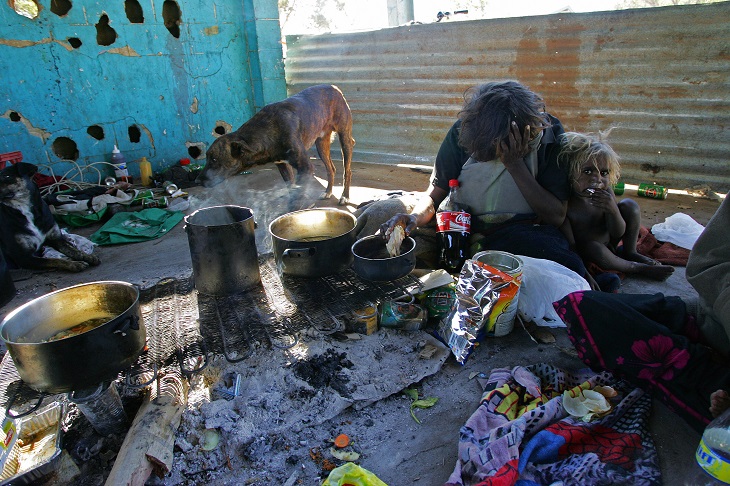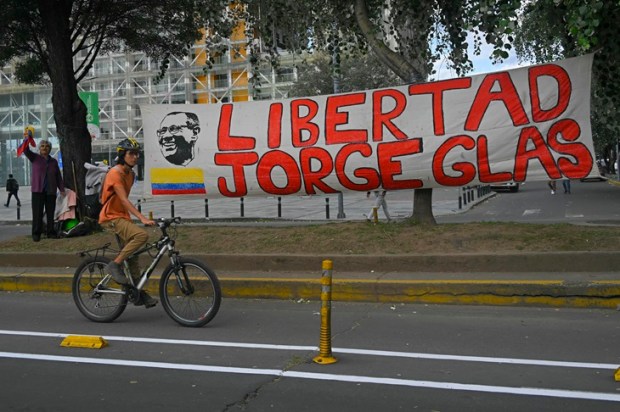It is not unusual for laws and policies, although well-intentioned, to have the opposite effect as that allegedly contemplated. Arguably, Australia’s worst sufferings and deprivations in our alleged free society have been greatly caused by the continuing implementation of welfare state policies.
Since the second world war, the Australian government has maintained and nurtured a burgeoning and expensive bureaucracy focused on the alleged welfare of the community. However, welfare dependence has aggravated the conditions which have perpetuated poverty and dependence. Decades of federal, state, and territory policies have miserably failed to improve the lives of Australia’s most disadvantaged peoples. For example, more than half (53 per cent) of all the Indigenous Australians aged 16 and over are receiving some form of Centrelink income support payment, compared with 26 per cent of non-Indigenous Australians of this age.
Although government aid can do some good for those needing only a temporary boost to get back on their feet, nonetheless, it is effectively a band-aid for a broken bone. After all, government aid cannot eliminate the more pressing moral and spiritual needs that lie at the heart of every dysfunctional behaviour. Indeed, sometimes what the recipient of governmental assistance really needs is a stronger message of work and sobriety. In this context, writes American Christian author Nancy R. Pearcey:
Government aid can actually make things worse. By handing out welfare checks impersonally to all who qualify, without addressing the underlying behavioural problems, the government in essence ‘rewards’ antisocial and dysfunctional patterns. And any behaviour the government rewards will generally tend to increase. As one perceptive 19th Century critic noted, government assistance is a ‘might solvent to sunder the ties of kinship, to quench the affections of family, to suppress in the poor themselves the instinct of self-reliance and self-respect – to convert them into paupers.
To a great extent, any behaviour that a government rewards generally tends to increase. Accordingly, the prevalence of passive welfare dependence could be directly responsible for the scourge of drugs, pornography, child abuse, and the effects of ‘humbugging’. The point is that government programs to help welfare recipients tend to exacerbate these problems. By handing out welfare checks impersonally to all who potentially qualify, without addressing the underlying behavioural problems, the government in essence ‘rewards’ dysfunctional behaviour that affects not only the recipient but their community at large as well.
Perhaps nobody has better expressed the ‘evil results of a too excessive solicitude on the part of the State’ than Wilhelm von Humboldt (1767-1835). This German philosopher, linguist, diplomat, and founder of the Humboldt University of Berlin, was correctly described by Friedrich Hayek as ‘Germany’s greatest philosopher of freedom’. In Chapter III of The Limits of State Action, Humboldt teaches us a very important lesson that should be learned by every single Australian citizen, Aboriginal or not:
The evil results of a too extensive solicitude on the part of the State, are still more strikingly shown in the suppression of all active energy, and the necessary deterioration of the moral character. […] The idea of the first no longer inspires him; and the painful consciousness of the last assails him less frequently and forcibly, since he can more easily ascribe his shortcomings to this particular position, and leave them to the responsibility of those who have made it what it is.
If we add to this, that he may not, possibly, regard the designs of the State as perfectly pure in their objects or execution – that he may suspect that his own advantage only, but along with it some other additional purpose is intended, then, not only the force and energy, but also the purity of his moral nature suffers. He now conceives himself not only completely free from any duty which the State has not expressly imposed upon him, but exonerated at the same time from every personal effort to improve his own condition; and, even fears such an effort, as if it were likely to open out new opportunities, of which the State might take advantage…
Further, the pernicious influence of such a positive policy is no less evident in the behaviour of the citizens to each other. As each individual abandons himself to the solicitous aid of the State, so, and still more, he abandons to it the fate of his fellow citizens. This weakens sympathy and renders mutual assistance inactive: … and experience teaches us that oppressed classes of the community which are, as it were, overlooked by the government, are always bound together by the closest ties. But whether the citizen becomes indifferent to his fellows, so will the husband be to his wife, and the father of a family towards the members of this household.
Theodore Dalrymple, who worked as a physician and psychiatrist in the poorest areas of London, says that poverty is often caused more by people’s worldview than their lack of material goods or money. Likewise, according to Peter Hitchens, ‘It is the decay of moral values and self-restraint … that has led to the misery of the modern poor.’
The increase of criminality over the years provides a good example. The idea that poverty or social conditions are sufficient causes of crime cannot be supported empirically in Australia. Indeed, the evidence shows that the highest levels of crime in memory, both in Australia and most of the so-called ‘Western democracies’, have occurred precisely at a time of unheard-of social welfare. As Hitchens points out:
‘This destroys the idea that increased welfare leads to a reduction in crime. On the contrary, it raises the possibility that well-meaning state intervention to improve the lot of the poor can actually lead to increased crime.’
The moral costs of the welfare state are, perhaps, in no other field more visible than in the field of family policy. Although the family serves as a primary means of acculturation and transmission of values from generation to generation, family ties in today’s societies are so weak that fewer people think they ought to help their family members. As a result, people in distress no longer expect to obtain much help this way.
Instead of addressing these problems, public policy seems to have further destabilised the family with disastrous consequences. For instance, the last few decades have seen the dramatic proliferation of laws allowing the unilateral dissolution of the marriage contract. By making divorce easily available and purely personal, the state transformed marriage into a legal absurdity that denies individual responsibility and holds no inducements to personal misconduct. And whenever and wherever the family breaks down the government will step in as a substitute for the family – hence the gradual increase of the state’s jurisdiction over the family.
We should also consider how in this country the welfare-state stymies the ability of individuals to provide charitable assistance. When assets are taken from individuals and their families – for example through taxation – this naturally leaves very little for them to donate to private charity. This oppressive regime of high taxation, which is inseparable from every government welfare, diminishes the sphere of free services by which free individuals engage in spontaneous social interactions, thus corroding the culture of civility that sustains a compassionate society. The inevitable result, of course, is the growing decrease in charitable activities coupled by the financial power acquired by the ruling political class to invest in the sort of ‘charitable service’ that such a class itself deems worthy to support.
Professor John Gray in an insightful preface to Bertrand de Jouvenel’s The Ethics of Redistribution, comments:
If, because of the confiscation of higher incomes, there are important social and cultural activities that can no longer be sustained privately, such as provision for high culture and the arts, then once again the state assumes responsibility for such activities through a program of subsidy. Inevitably, the state comes to exercise ever-increasing degree of control over them. The consequence of redistributionist policy, accordingly, is the curtailment of private initiative in many spheres of social life, the destruction of the man of independent means, and the weakening of civil society.
The very concept of a welfare ‘entitlement’ runs contrary to the natural understanding of aiding the poor. Helping others is a moral duty and is not essentially exercised through coercion or government mandates. However, as noted by the Rev Robert Sirico, ‘The modern, central state has proven itself incapable of distinguishing between the deserving and the underserving poor, and between aid that fosters independence and moral development from that which reinforces a dependency mindset and moral nihilism.’
In this context, welfare state policies eventually create a distortion of the natural order of liberty, because governments that claim to provide almost everything to their citizens will inevitably undermine private initiative and personal responsibility. The reason for limiting government power is simply that people should be free and have their individual rights protected.
Unfortunately, however, most of my fellow citizens are now inclined to look on government aid as a ‘right’ and an ‘entitlement’. They usually regard themselves as perfectly entitled to every form of government assistance, thus preventing them from making attempts to preserve their self-respect and consider their own self-worth.
Australia is rich in natural resources and raw materials. And yet, natural resources and raw materials, in and of themselves, are not productive. They require the application of human thought, ingenuity, and energy to make them useful. The production of wealth comes more from the creativity and hard work fostered by an economic system that encourages free individuals to invest their wealth in productive enterprises, thus making jobs, goods, and services available to others.
But who are the primary beneficiaries of the all-encompassing presence of an omnipotent Australian State? And what impact does this amassing of power in the hands of a few have on the common good?
Despite the seemingly good intentions, to a great extent excessive state intervention on society results in a re-distribution of power from the individual to the State. All that is achieved is a huge and expensive bureaucracy – an ‘elite’ of state-appointed people who are lavishly sustained by a permanent underclass of chronically poor individuals and their families. As a consequence, writes Tom G. Palmer in After the Welfare State (2012):
The poor suffer the worst, because a trickle of benefits may seem like a boom to them, when their very poverty is both perpetuated by the welfare state and deepened by the hidden transfers from the powerless to the powerful caused by protectionism, licensing, and other restriction on labour market freedoms, and all the other privileges and special deals the powerful, the educated, the articulated, and the empowered create for themselves at the expense of the weak, the uneducated, the voiceless, and the disempowered.
Economic freedoms and the right to private property are crucial in maintaining a wealthy and prosperous Australia. And yet, in an increasingly socialist economy, Australians have already relinquished a great deal of control over their personal lives to the Australian State, which requires considerable governmental control over the distribution of goods and services.
Because the present economic model relies on a powerful government to achieve its desired goals, the policies adopted by the ruling classes invariably multiply and perpetuate problems for the poor by creating needless bureaucracies and concentrating too much power in the hands of a few individuals, namely the illiberal politicians, CEOs of big corporations, and an ever-expanding bureaucratic caste responsible for sustaining a statist model that effectively enslaves the poorest and most disadvantaged members of our society.
Augusto Zimmermann is professor and head of law at Sheridan Institute of Higher Education and served as associate dean at Murdoch University, School of Law. He is also a former commissioner with the Law Reform Commission of Western Australia. Professors Zimmermann is the joint author of ‘Foundations of the Australian Legal System: History, Theory and Practice’ (LexisNexis, 2023).
Got something to add? Join the discussion and comment below.
Get 10 issues for just $10
Subscribe to The Spectator Australia today for the next 10 magazine issues, plus full online access, for just $10.


























Comments
Don't miss out
Join the conversation with other Spectator Australia readers. Subscribe to leave a comment.
SUBSCRIBEAlready a subscriber? Log in